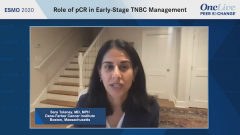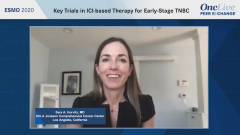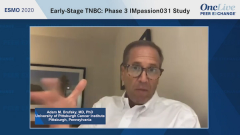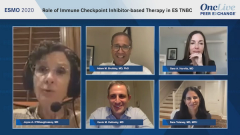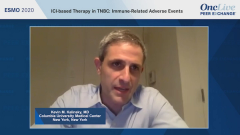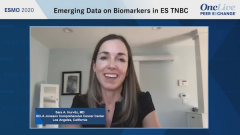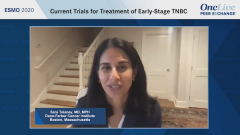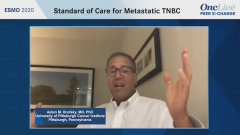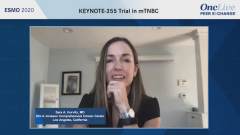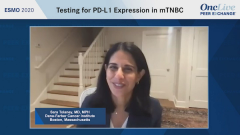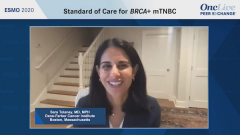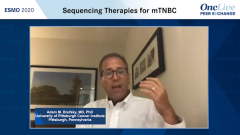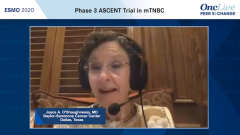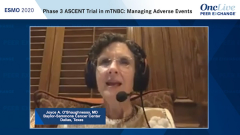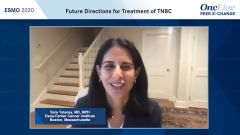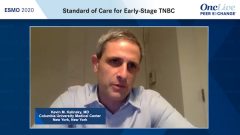
Early Stage TNBC: Phase 3 IMpassion031 Study
Episodes in this series

Adam M. Brufsky, MD, PhD: It was really weird. I’d love for Kevin to give a comment and maybe we’ll discuss this because he was the commenter on the NeoTRIP trial, and why it didn’t work. Because we have IMpassion031 now, and we knew it in a press release before ESMO. The idea behind IMpassion031 is they had 330 women with triple negative breast cancer, with a primary tumor greater than 2 cm. They had to have at least T2 disease; they could have N0 to N3 disease.
They had to have a known PD-L1 status, no prior treatment, and a decent performance status. They randomized them 1:1 to either atezolizumab with nab-paclitaxel weekly for 12 weeks, followed by atezolizumab with AC [doxorubicin, cyclophosphamide], Q2 [every 2] weeks. It was dose-dense [doxorubicin, cyclophosphamide]. So, it was weekly nab-paclitaxel, followed by dose-dense AC [doxorubicin, cyclophosphamide] times 4 with or without atezolizumab. It was placebo controlled. Then in the people who afterward, again there was a second randomization, but if you were randomized to the atezolizumab arm, you had 1200 mg intravenously Q3 [every 3] weeks for 11 doses. What was interesting is it was an adaptive design. They initially had started all comers, and then the IMpassion031 data came out, and they restricted it to the PD-L1 only patients. They required them to be PD-L1 positive in the trial, but the primary analysis was all 333 patients.
Looking at the results of the trial, it was interesting that overall in the study, the pathologic complete response rate was about 58%. It was 57.6% vs 41.1% overall, regardless of PD-L1 status. Joyce, you were saying what’s the baseline? There it is. That’s your baseline of all comers getting typical AC [doxorubicin, cyclophosphamide] or TAC [docetaxel, doxorubicin, cyclophosphamide] chemotherapy with the [docetaxel, doxorubicin, cyclophosphamide] being dose dense, is 41%. You did get, regardless of PD-L1 status, an improvement here of about 16% or 17 %. So afterwards, dividing it up by PD-L1 versus non PD-L1, the PD-L1 positivity was about 69%, it was 68.8% vs about 50%, 49.3% in terms of a pathologic complete response. Interestingly, and this is something that we really need to discuss, the patients who were PD-L1 negative, again SP142 less than 1%, assuming that meant they just had no TILs [tumor-infiltrating lymphocytes], is what I really believe it is.
Looking at that, it was 47.7% vs 34%. You’re getting a benefit here of about 13%, 14% in pathologic complete response from the checkpoint inhibitor in a PD-L1 negative subgroup of patients. I think that’s kind of important, looking at the hazard, plus it was across everybody, it didn’t matter. Again, inconsistent with the KEYNOTE-522 data, what they found is that in the atezolizumab arm, the event-free survival, when they checked, it was 10.3% had relapsed vs 13.1% with the placebo. This is in the median follow-up of about 20 months, and it was 4.2% in terms of overall death vs 5.4 %, a very small amount, but trending in the right direction. The hazard ratios were all about 0.7, 0.8, 0.6, something like that. The bottom line of this trial—and I guess we’ll talk about toxicity later, I won’t go into the toxicity, but just the results now—is that it looked like it was very similar in a way to KEYNOTE-522.
Now, why was it different from NeoTRIP, but the same roughly—we can argue about the details—as KEYNOTE-522? It’s really weird. I don’t want to steal your thunder, Joyce, but I’d love to hear from Kevin, again what he had said at San Antonio about why they were so different. Why would atezolizumab work in one of these and look kind of like KEYNOTE-522, kind of like pembrolizumab, but on the other scenario wasn’t? Is it patient selection? Is it the chemotherapies? What is it?
Joyce A. O'Shaughnessy, MD: That’s great, super. Thanks so much, Adam. Those were really important data out of ESMO.
Transcript Edited for Clarity


